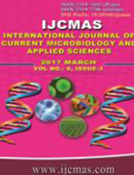Production of Millet-Based (Pennisetum glaucum) Ablo and Sorghum-Based (Sorghum bicolor) Ablo Cultivated in the Republic of Benin
Jultesse S.B. Banon1*, Innocent Yaou Bokossa1, Celestin C.K. Tchekessi1, Roseline Bleoussi1, Pivot Sachi1, Anayce Djogbe1, Karl Assogba1, Farid Bade1, Edwige Dahouenon-Ahoussi2, Azokpota Paulin3 and Guy Apollinaire Mensah4
1Research Unit in Safety Health Food (URSSA) , Laboratory of Microbiology and Food Technology (LA.MI.TA), Department of Plant Biology, Faculty of Sciences and Techniques (FAST), University of Abomey - Calavi (UAC), Cotonou 04BP 1107, Benin
2Food Technology Genius Laboratory, Polytechnic School of Abomey-Calavi (EPAC), University of Abomey-Calavi (UAC), Benin
3Laboratory of Molecular Biology and Formulation of Food, Department of Nutrition, Food Science and Technology, Faculty of Agronomic Sciences (FSA), University of Abomey-Calavi (UAC), 01BP 526 Cotonou, Benin
4National Institute of Agricultural Research of Benin (INRAB), 01 BP 884 Main Recipe, Cotonou 01, Benin
*Corresponding author
Abstract:
Ablo is a wet bread, slightly salty and sweet, steamed and sold in the form of pellets. The study is intended to develop the production’s technology of two new types of Ablo. The methodology adopted consists of carrying out production tests according to the original process described by Aholou-yeyi (2007) modified. The results showed that production of sorghum-based Ablo technology and production of millet-based Ablo technology followed four main steps, namely: the preparation of flour, the preparation of the dough to ferment, fermentation and cooking. Fermentation lasted 2-3 hours for the millet-based Ablo and 3 hours for the Ablo made from sorghum. The cooking time of the fermented dough was 15 to 20 minutes. Millet-based Ablo and sorghum-based Ablo had an alveolar structure and were more consistent than the fermented dough.
Keywords: Ablo, Millet, Sorghum, Fermentation, Benin.
Download this article as 
How to cite this article:
Jultesse S.B. Banon, Innocent Yaou Bokossa, Célestin C.K. Tchekessi, Roseline Bleoussi, Pivot Sachi, Anayce Djogbe, Karl Assogba, Farid Bade, Edwige Dahouenon-Ahoussi, Azokpota Paulin and Guy Apollinaire Mensah. 2017. Production of Millet-Based (
Pennisetum glaucum) Ablo and Sorghum-Based (
Sorghum bicolor) Ablo Cultivated in the Republic of Benin
Int.J.Curr.Microbiol.App.Sci. 6(3): 276-282. doi:
https://doi.org/10.20546/ijcmas.2017.603.030
 Citations
Citations



 National Academy of Agricultural Sciences (NAAS)
National Academy of Agricultural Sciences (NAAS)





